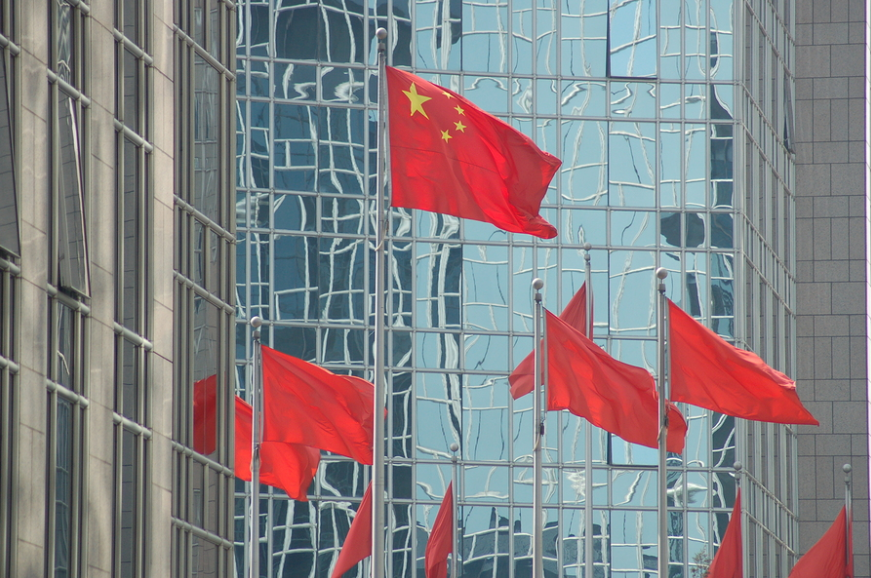Nogle af de største kinesiske virksomhedsgiganter har meddelt børsen i New York, at de vil opsige noteringen på New York-børsen. Spørgsmålet er nu, skriver Saxo Bank, om det vil føre til, at mange private mega-virksomheder i Kina vil afnotere sig. Selskaberne, der vil afnotere sig, er bl.a. PetroChina, Sinopec, Chalco og China Life Insurance. Årsagen er, at USA-myndighederne vil have samme indsigt i de kinesiske selskabers regnskaber, som de har med alle andre, og det vil Kina ikke acceptere. Derfor kommer der nu fokus på f.eks. internetselskaber som Alibaba og Weibo, der handles heftigt i USA: Vil de også trække sig? Det kan føre til kursfald på disse selskaber og føre til turbulente forhold, mener Saxo Bank.
China Update: State-owned giants seek to delist from the New York Stock Exchange
Summary: PetroChina, Sinopec, Sinopec Shanghai Petrochemical, Chalco and China Life Insurance notified the New York Stock Exchange on 12 Aug 2022 of their intended application for voluntary delisting of their American depository shares and terminating the relevant ADR programs. The question now is if this is an example set for mega-cap Chinese internet and platform companies to follow.
On August 12, 2022, after the close of the regular session of the Stock Exchange of Hong Kong, PetroChina (00857:xhkg/PTR:xnys), China Petroleum & Chemical Corporation, also known as Sinopec (00386:xhkg/SNP:xnys), Sinopec Shanghai Petrochemical (00338:xhkg/SHI:xnys), Aluminum Corporation of China, also known as Chalco (02600:xhkg/ACH:xnys), and China Life Insurance (02628:xhkg/LFC:xnys) announced that they had notified the New York Stock Exchange (“NYSE”) that they are will apply for delisting of their American depository shares (“ADSs”) from the NYSE. It is expected that the American Depository Receipt (“ADR”) programs will be terminated between September 1 and October 16, 2022, and the ADSs issued under these ADR programs can be surrendered for their underlying H shares, which will continue to trade in the Stock Exchange of Hong Kong (“SEHK”).
PetroChina, Sinopec, Sinopec Shanghai Petrochemical and Chalco are Central SOEs that are owned (80.4%, 68.8%, 32.2%, and 50.4% respectively) and controlled by the State-owned Assets Supervision and Administration Commission of the State Council (“SASAC”). These, together with 93 others that are also owned and controlled by the SASAC are known as Central SOEs or “Yang Qi” in Chinese. China Life Insurance, not one of those under the SASAC, is not a Central SOE in the strict sense but it is usually considered a Central SOE due to the fact that it is 62.4% owned and controlled by the Ministry of Finance.
All five companies are on the U.S. Securities and Exchange Commission’s (“SEC”) conclusive list of identified entities under the HFCAA
In the U.S., the Sarbanes-Oxley Act enacted in 2002 requires publicly traded companies to give the U.S. Public Company Accounting Oversight Board (“PCAOB”) access to audit work papers. In 2009, the China Securities Regulatory Commission (“CSRC”) issued a rule that forbids overseas regulatory authorities from inspecting Chinese auditing firms without CSRC’s prior approval and audit work papers containing state secretes from being taken outside China. The PCAOB’s attempt to inspect the China-based affiliates of the “Big”-4” accounting firms in 2010 was rejected by the CSRC. The SEC subsequently prosecuted these China affiliates of the Big-4 and the cases were subsequently settled.
In order to tighten the enforcement of the audit work papers requirement provided in the Sarbanes-Oxley Act, the U.S. enacted the Holding Foreign Companies Accountable Act (“HFCAA”) in 2020 which provides that companies failing to make available audit work papers for inspection by the PCAOB cannot be traded in a U.S. exchange. Since March 2022, the SEC has put 162 Chinese companies listed in a U.S. bourse first on a provisional list and then 155 of them subsequently on a conclusive list of issuers identified under the HFCAA.
After rounds of negotiations, the U.S. and China have so far not been able to come to some resolutions. While the Chinese authorities have sounded optimistic, especially earlier in April and May, about eventually reaching an agreement with the U.S., SEC Chairman Gary Gensler has expressed doubts about any eventual agreement.
PetroChina, Sinopec, Sinopec Shanghai Petrochemical, Chalco, and China Life Insurance are among those on the conclusive list and facing the plausibility of being delisted by the U.S. regulators from the NYSE. The deadline for delisting is in 2024 but the U.S. Congress is considering passing a bill to bring the deadline forward to 2023.
Actions were seemingly in concert
Each of the five companies notified the NYSE on the same day, August 12, and provided similar reasons for their decisions in their filing with the SEHK, namely relatively small capitalization of H shares being represented by ADSs, small ADS trading volume compared to the turnover of H shares and administrative burden for performing reporting and disclosure. The China Securities Regulatory Commission (“CSRC”) said on Friday that the delisting decision had been made out of these companies’ own business decisions. Nonetheless, given the identical timing, similar reasons provided and status of Central SOEs, one has to wonder if they were acting in concert with coordination from the Chinese authorities. The other two Central SOEs controlled by the SACAC and on the SEC conclusive list, China Eastern Airlines (00670:xhkg/CEA:xnys) and China Southern Airlines (01055:xhkg/ZNH:xnys) will probably apply for ADS delisting soon as well.
Chinese internet and platform companies are the focus in the coming weeks
While these Central SOEs are thinly traded on the NYSE, the shares of Chinese internet and platform private enterprises, including Alibaba (09988:xhkg/BABA:xnys), Baidu (09888:xhkg/BIDU:xnas), Bilibili (09626:xhkg/BILI:xnas), JD.COM (09618:xhkg/JD:xnas), Pinduoduo (PDD:xnas), Sohu (SOHU:xnas), iQiyi (IQ:xnas), KE Holdings (BEKE:xnys), Weibo (09898:xhkg/WB:xnas), Tencent Music Entertainment (TME:xnys) are widely held and actively traded on the NYSE or Nasdaq. For examples, Bilibili and Weibo have larger average daily turnover in Nasdaq than in the SEHK and Pinduoduo, iQiyi, KE Holdings, Sohu and are listed only on Nasdaq and Tencent Music on the NYSE.
Alibaba is on the provisional list and the other names above are on the conclusive list of issuers identified under the HFCAA. All of them will be subject to mandatory delisting from the NYSE or Nasdaq if the Chinese and U.S. regulators cannot reach an agreement to resolve the audit work paper inspection issue in the coming months.
Given these internet and platform companies hold a huge amount of potentially sensitive data of hundreds of millions of Chinese individuals as well as numerous private as well as public enterprises and institutions, the plausibility of the Chinese government being willing to make a concession to the SEC and PCAOB regarding the latter’s unfiltered access to audit work papers of these companies is getting increasingly slim in the midst of pervasive Sino-American strategic competition.
Through the voluntary delisting of Central SOEs, the Chinese authorities may have set an example for the internet and platform companies to follow. If that happens to be the case, the share prices of these internet and platform giants will be facing more headwinds as we set out in a previous article. Some U.S. institutional money which is restricted by their investment mandates and retail investors who tend to have a home bias will unload their holdings instead of exchanging their ADSs for H shares. In the case of those companies that do not yet have a listing in the SEHK, the uncertainty and disruption will be even more significant. The southbound stock connect flows of money from mainland investors may mitigate somewhat the impact but some turbulence initially can probably be expected.











